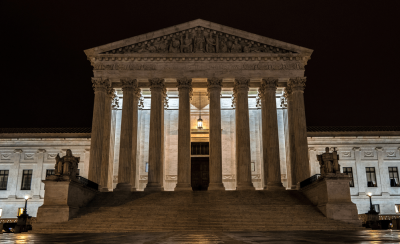Due Process and the Courts
What does the constitution say about due process?
The Fifth Amendment to the Constitution says clearly that no person shall be deprived of life, liberty, or property without the due process of law. Note that this says person, not citizen, and over the years the Supreme Court has consistently ruled that the Due Process Clause applies to all people in the United States.Do non-citizens have the right to due process in the U.S.?
Yes. The Constitution guarantees due process rights to all "persons," not just citizens. This means non-citizens, including undocumented immigrants, are entitled to fair treatment under the law. This includes the right to defend themselves in court. But recent Trump administration policies that speed up deportations and limit access to legal representation make it harder for non-citizens to get their fair day in court.- Access to legal representation Access to legal counsel is an essential part of our justice system and our democracy. In the criminal justice system, anyone facing even one day in jail gets a lawyer if they can't afford one. But immigrants facing deportation usually don't get that chance.The research is clear – the most effective way to ensure some level of due process for people navigating our complicated immigration system is for them to have trained attorney at their side. But Trump administration is now working to strip attorneys from as many people as possible, all in the name of increasing its deportation numbers. This attempt to eliminate basic due process will hurt people who already have few options.
- Fair day in court Due process guarantees that individuals have the opportunity to defend themselves in court. This includes non-citizens facing deportation.
Why is due process important?
We are seeing right now the importance of due process when it comes to President Trump's actions to carry out the so-called Alien Enemies Act, a 1798 wartime law that permits people to be deported outside of the normal framework of immigration law. President Trump has alleged that this law allows him to simply point at any person, declare them to be an alien enemy, and kick them out of the country without ever having a chance to see a judge. Thankfully, the Supreme Court said that is not true, and in a unanimous decision, ruled that people can challenge the Trump administration's invocation of the Alien Enemies Act. That is why due process is so important, because it means that no person can be rounded up and sent to another country without a chance to go to court and make the government prove their case.How is the American Immigration Council working to protect due process?
- We serve thousands of individuals in immigration detention centers through the Immigration Justice Campaign, our initiative with the American Immigration Lawyers Association. The Justice Campaign provides free legal services for immigrants who would otherwise have to navigate our complicated immigration system without a lawyer.
- We use the courts to demand a fair process for immigrants. Our litigation team is fighting back against the Trump administration’s blatant disregard for due process including filing a lawsuit challenging their illegal detention of immigrants in El Salvador’s notorious Terrorism Confinement Center (CECOT).

Ninth Circuit Finds Court Has No Authority to Hear Lawsuit Seeking Access to Counsel for Children
In 2014, a legal challenge was mounted against the federal government for its failure to provide legal representation to indigent children in deportation proceedings. The case, F.L.B.. v. Lynch was brought by the American Immigration Council, American Civil Liberties Union, the Northwest Immigrant Rights Project, Public Counsel, and K&L… Read More

Developments with Respect to the One-Year Deadline for Filing Asylum Applications
Northwest Immigrant Rights Project (NWIRP), Dobrin & Han, PC, American Immigration Council, and the National Immigration Project of the National Lawyers Guild commend the Executive Office for Immigration Review (EOIR) for reversing course and now allowing asylum applicants to file their applications by mail or in person at an immigration court window. Read More

Immigrants’ Access to Legal Representation Is Unequal and the Consequences Are Serious
Nationally, only 37 percent of all immigrants had legal representation, and only 14 percent of immigrants in detention had a lawyer. In a paper issued today, Access to Counsel in Immigration Court, Ingrid Eagly and Steven Shafer analyzed 1.2 million individual removal cases in immigration court between fiscal years… Read More

Access to Counsel in Immigration Court
Immigrants in immigration court do not have a right to government-appointed counsel. The lack of legal representation has a profound impact on immigrants’ outcomes in removal proceedings. Read More

Legal Challenges to Arizona’s SB 1070 End–For Now
After six years of challenges, including a trip to the Supreme Court, the legal battle over Arizona’s SB 1070 has come to an end—for now. The law faced a wave of opposition soon after going into effect in April 2010. In May 2010 civil and immigrant rights groups including the… Read More

Practice Tip: Mandamus May Get Results When Nothing Else Works
This Practice Tip demystifies mandamus by explaining how and when to ask a court for this remedy when a client has been waiting too long for USCIS to make a decision.

Behind Closed Doors: An Overview of DHS Restrictions on Access to Counsel
The report describes restrictions on access to legal counsel before DHS, provides a legal landscape, and offers recommendations designed to combat DHS’s harmful practices. It also addresses changes to USCIS guidance made in 2012, intended to expand access to legal representation. Read More

Government Admits Providing False Information to Supreme Court
Last week, the Department of Justice (DOJ) sent a letter to the Supreme Court alerting the Justices that it had provided the Court with incorrect information regarding how long certain noncitizens were held in detention. DOJ initially had provided this false information to the Supreme Court in 2002 for… Read More

New Lawsuit Challenges Preliminary Injunction in United States v. Texas
In February 2015, a court in Texas issued a nationwide preliminary injunction in the case challenging the expansion of President’s Obama’s Deferred Action for Childhood Arrivals (DACA) initiative and the launch of Deferred Action for Parents of Americans and Lawful Permanent Residents (DAPA). The injunction effectively halted implementation of… Read More
Make a contribution
Make a direct impact on the lives of immigrants.
